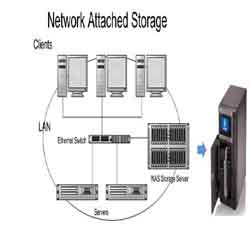Network Attached Storage (NAS)

Network-attached storage (NAS) is a file-level (as opposed to block-level) computer data storage server connected to a computer network providing data access to a heterogeneous group of clients. NAS is specialized for serving files either by its hardware, software, or configuration. It is often manufactured as a computer appliance – a purpose-built specialized computer.[nb 1] NAS systems are networked appliances which contain one or more storage drives, often arranged into logical, redundant storage containers or RAID. Network-attached storage removes the responsibility of file serving from other servers on the network. They typically provide access to files using network file sharing protocols such as NFS, SMB, or AFP. From the mid-1990s, NAS devices began gaining popularity as a convenient method of sharing files among multiple computers. Potential benefits of dedicated network-attached storage, compared to general-purpose servers also serving files, include faster data access, easier administration, and simple configuration.
NAS stands for Network Attached Storage. It allows you to connect large amounts of storage directly to a broadband router. Therefore, this storage is available for all devices. The NAS drive is designed to be permanently open, which means you can access music, movies, photos and documents at any time.